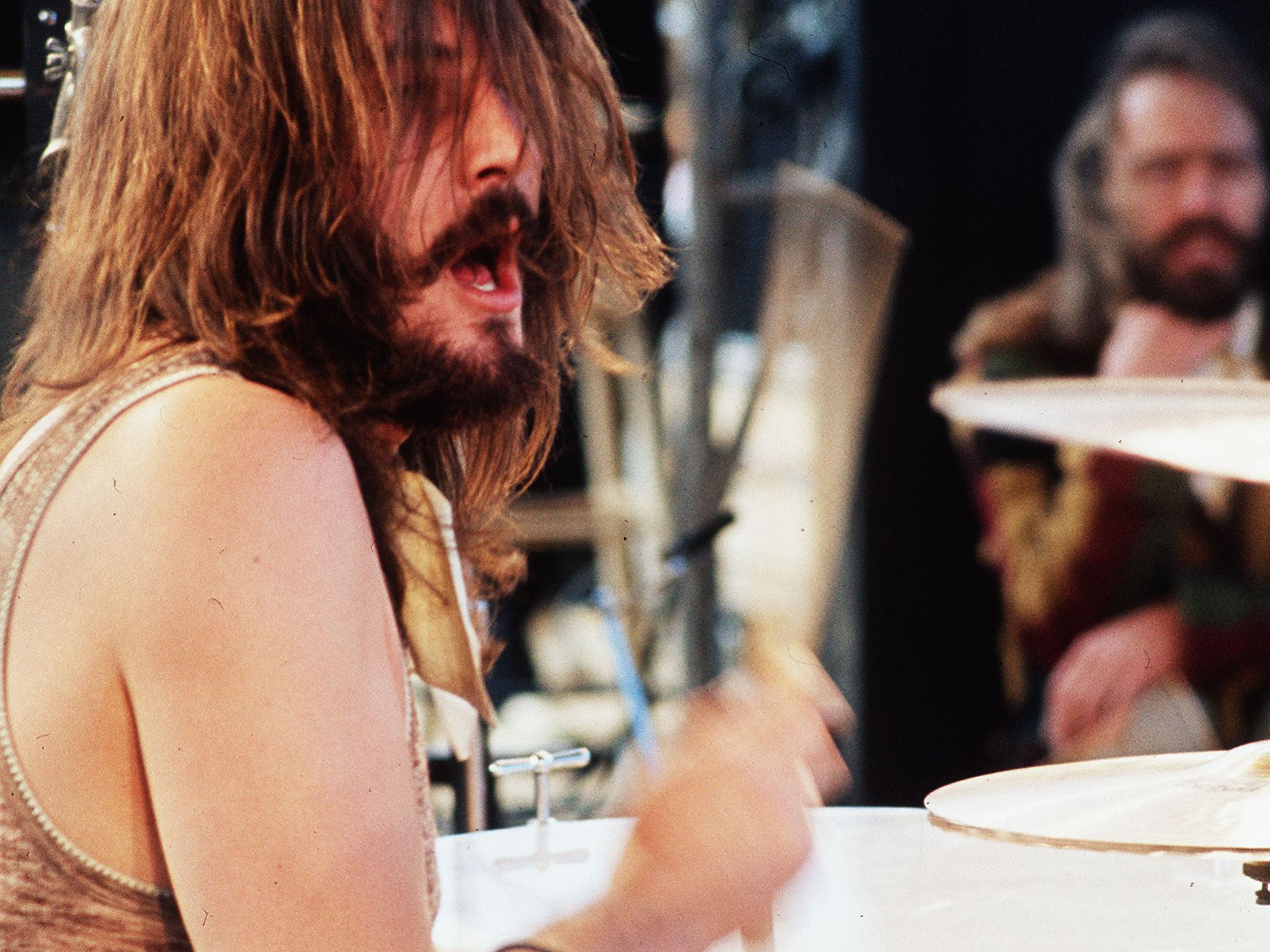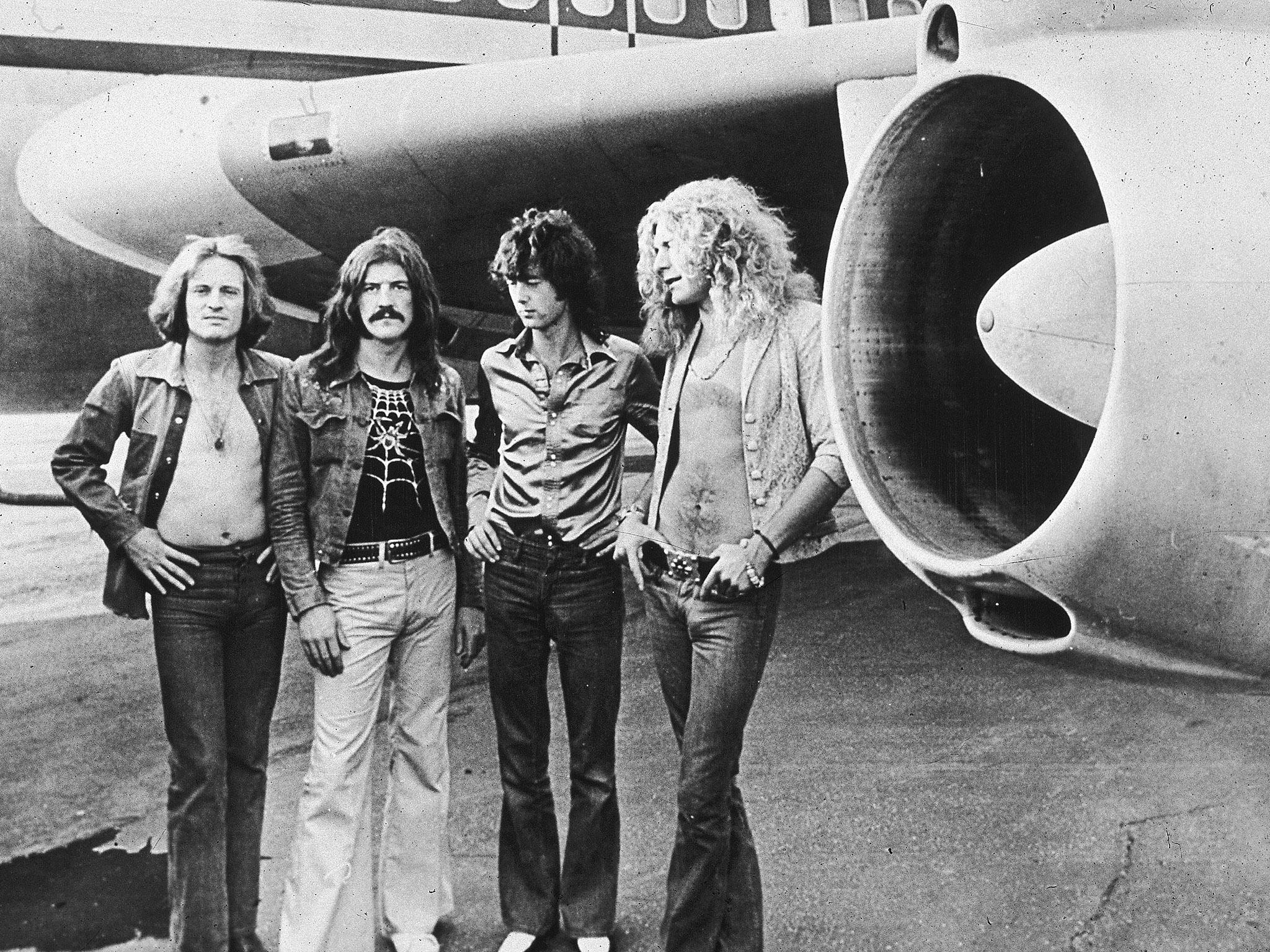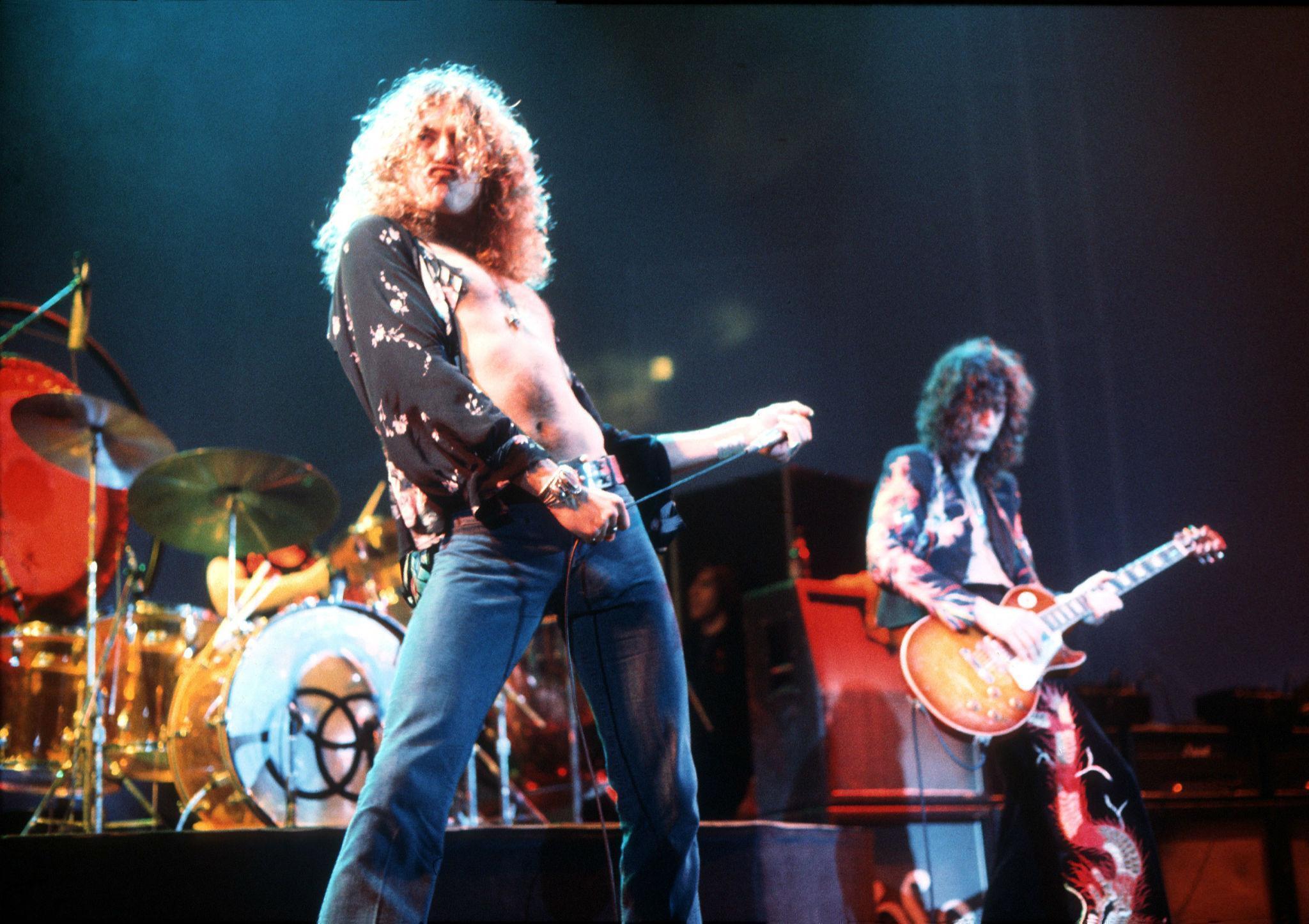Your support helps us to tell the story
From reproductive rights to climate change to Big Tech, The Independent is on the ground when the story is developing. Whether it’s investigating the financials of Elon Musk’s pro-Trump PAC or producing our latest documentary, ‘The A Word’, which shines a light on the American women fighting for reproductive rights, we know how important it is to parse out the facts from the messaging.
At such a critical moment in US history, we need reporters on the ground. Your donation allows us to keep sending journalists to speak to both sides of the story.
The Independent is trusted by Americans across the entire political spectrum. And unlike many other quality news outlets, we choose not to lock Americans out of our reporting and analysis with paywalls. We believe quality journalism should be available to everyone, paid for by those who can afford it.
Your support makes all the difference.
“They had the poser frontman, the ultra-cool lead guitarist, the heavy nutcase drummer – all the cliches,” Slade’s Noddy Holder once said. The thing is, the band he was talking about, Led Zeppelin, created the cliches themselves. Trashed hotel rooms, orgies, booze binges, drugs, a reputation for violence, underage inamoratas, groupies, heavy metal, headbanging, stadium rock, Tolkien references, godlike status, dabbling with the occult… oh, and how to go from rock to staggering riches. Led Zeppelin did it all, and then some. Half a century ago.
The formation of the band in summer 1968 is well documented. Jimmy Page was the last of the triumvirate of blues virtuosos to have played lead guitar for the Yardbirds, after Eric Clapton and Jeff Beck, but as the band fell apart, he was the one left trying to put together a New Yardbirds for an already booked tour of Denmark and Sweden.
Their star was waning. Clapton had long since left to form the supergroup Cream, Beck was having solo success, but Page, who had been raking in the cash since 1963 as an ace session guitarist, adding licks to records by artists from Val Doonican to Lulu to Screaming Lord Sutch, wasn’t going to give up his chance of fame. He was 24 years old and had joined his longtime pal Beck in the Yardbirds as bassist, before taking over from the temperamental guitar hero.
But he needed a new singer and drummer. Original bassist Chris Dreja looked set to stay, but was later moved aside for another musically gifted session player, John Paul Jones, who had been persuaded to change his name from the lumpen John Baldwin by the Rolling Stones’ manager Andrew Loog Oldham. Like Page, he wanted to get out of the studio and onto the stage, too.
The New Yardbirds already had a manager, the hulking Peter Grant, who shared an office with the “Al Capone of Pop”, Don Arden – future father-in-law to Ozzy Osbourne.
Finding a singer was the hard bit. Page had thought about Steve Marriott of the Small Faces, managed by Arden, who had reportedly responded by asking how well Page thought he would play guitar with 10 broken fingers. Page had also wanted a singer called Terry Reid, but he was signed to a solo deal with the cigar-smoking, Rolls-Royce-driving, pop impresario Mickie Most, and was booked to support the Stones on a US tour. Reid suggested a singer he’d seen in Birmingham, the epicentre of a Black Country blues scene that would produce Black Sabbath, ELO, the Moody Blues and Slade.
The singer he had in mind was Robert Plant – that “poser frontman”, who used to go to the same youth club as Noddy Holder in the West Midlands when they were teenagers, where they had rival bands – Plant’s Listen and Holder’s N’Betweens. They both ended up cutting the same single in 1966, a cover of the Young Rascals’ “You Better Run”. (Plant’s version is way better.)
But by the time Page and Grant reluctantly drove to Birmingham to see him perform, Plant was strutting his stuff in a band called Obs-Tweedle. Grant remembered Page’s first impression of the singer, when he opened the door to let the pair, plus Dreja, backstage: “Crikey, they’ve got a big roadie!” But when Page first heard the wildness of Plant’s “primeval wail” doing Jefferson Airplane’s «Somebody to Love», the pieces for his new band started to click into place.
Plant visited Page in his boathouse on the Thames at Pangbourne, and their musical chemistry revealed itself. They both liked English folk and Joan Baez, rock ’n’ roll and Chicago blues. Plant was in, and he had an idea about who the drummer should be.
Enjoy unlimited access to 100 million ad-free songs and podcasts with Amazon Music
Sign up now for a 4 month free trial (3 months for non-Prime members)
Enjoy unlimited access to 100 million ad-free songs and podcasts with Amazon Music
Sign up now for a 4 month free trial (3 months for non-Prime members)
He’d first met John Bonham when he was 16, and as Barney Hoskyns’s oral history of the band, Trampled Under Foot, reveals, Plant remembered it well: “There was a guy with quite an arrogant air to himself, very cocky, standing watching me. He said, ‘You’re pretty good, but you’d be a lot better if you had a drummer like me.’ I thought, ‘Nobody says that sort of thing to me. Don’t they know who I might one day end up being?’”

Bonham, aka Bonzo, was a talented, hard-hitting drummer with a violent streak, who worked on building sites and played drums at night. But he was already in a back-up band that paid him £40 a week, and he was the hardest to persuade. If anything showed how far The Yardbirds’ stock had fallen, it was Bonham’s refusal to join Page’s restocked showcase for his talent. Finally, his old mate Plant talked Bonham into joining, and the band was complete. At their first rehearsal, Page recalled: “Four of us got together in this room. Then we knew.”
It was straight into action. On the Scandinavian tour in September 1968, the band ditched their old name and became Led Zeppelin. Lead lost an “a” so that Americans wouldn’t pronounce it wrong. In October, Zeppelin went into the studio and recorded their first album. The chopped opening chords of “Good Times Bad Times” set the tone. (In fact, it would be possible to trace the progression of Zeppelin through their first six albums by the brilliance of the riffs on side one, track one – “Good Times Bad Times”, “Whole Lotta Love”, “Immigrant Song”, “Black Dog”, “The Song Remains the Same” and “Custard Pie”.) Grant secured a deal with Ahmet Ertegun’s Atlantic Records, and Led Zeppelin became the first rock act on the famous label.
The album had been recorded in time for an American tour, but the influential magazine Rolling Stone dismissed it. “Good Times Bad Times” was ideal for a Yardbirds B-side, “Babe I’m Going to Leave You” was “very dull in places”, Plant’s vocals consisted of “strained and unconvincing shouting” and the album as a whole was a waste of talent on unworthy material. There was not a mention of “Communication Breakdown” or “Dazed and Confused”.
But with the backing of the press or not, when the group left London for LA on Christmas Day 1968, they were flying towards their destiny as “the biggest band in the world”. The UK may have prided itself on “discovering” Jimi Hendrix, but Led Zeppelin were to be an American phenomenon that gradually caught on back home. By the time they flew back in February, after a 36-date tour with barely a night off in between, the album was in the Billboard 100.
One of the centrepieces of the show was “Dazed and Confused”, credited to Page as sole composer, but actually an update of a song about a bad acid trip by California singer-songwriter Jake Holmes, which Page had heard on tour with the Yardbirds. Cultural appropriation, if not downright theft, was a charge levelled at Zeppelin for years, for their use of uncredited riffs from blues pioneers. Rolling Stone had another go at them for it when they released their second album, just 10 months after their first, but their largely teenage audience didn’t care.
Zeppelin were young, too. Bonham and Plant were just 20 years old at the start of 1969, Jones was 22, Page, still 24, and they were soon journeying to the wilder shores of rock ’n’ roll excess, aided and abetted by tour manager Richard Cole. The alleged “red snapper incident” in Seattle in July 1969 has taken an increasingly uncomfortable place in rock legend.
The band were staying at the Edgewater Inn, which as its name implied offered the chance to fish directly from the hotel’s windows. The account in Stephen Davis’s exhaustive unauthorised biography Hammer of the Gods is based on an interview with Cole. It diverges from the original narrative only insofar as the female fan tied to a bed did not have pieces of freshly caught shark stuffed into her vagina and rectum, but that the nose of a live red snapper was applied to her by Cole, who said that the whole episode was filmed by a member of Vanilla Fudge. The US rock band, however, have since also claimed responsibility for the incident and said that only Bonham was in the room at the time.
Whichever, it’s fair to say that, beloved as Zeppelin were by the groupies who followed the band, their attitude to women at the time would probably sink them today. Twenty-four-year-old journalist Ellen Sander joined them on their second tour, and later wrote about it: “They seemed particularly delighted with the aspect of abuse in almost any situation regarding girls who sought them out.” – “Girls come around and pose like starlets, teasing and acting haughty,” she quoted Page as saying, “If you humiliate them a bit they tend to come on all right after that. Everybody knows what they come for and when they get here they act so special. I haven’t got time to deal with it.”

She didn’t write up her piece for Life magazine, who had given her the assignment, after an incident at the end of the tour, of which she wrote: “Two members of the group attacked me, shrieking and grabbing at my clothes, totally over the edge. I fought them off until Peter Grant rescued me but not before they managed to tear my dress down the back.”
Earlier, she noted: “No matter how miserably the group failed to keep their behaviour up to a basic human level, they played well almost every night of the tour.” Their live recordings – and there might have been more, if Grant had not pursued a regime of terror against anyone caught taping the band illegally – bear this out. Zeppelin nearly always kept it together and sounded immense.
Of the other stories that coalesced around the group, most of them were more or less true. A violent incident in which Bonham may have been involved was hushed up . He was certainly arrested, along with Grant, Cole and security man John Bindon, on a charge of battery after an attack on as many as three stage hands at a concert in Oakland in 1977. The promoter, Bill Graham, went on record to say that he had agreed to sign a document promising not to demand more than $2,000 for the damage to his employees before the band would agree to go on.
The drummer’s serious problems with alcohol, which led to his early death, aged 32, in 1980, after downing 40 vodkas, would surely have attracted repeated interventions now. But his appetite for destructive rage certainly set the standard for any would-be hotel-room-trashing bands.
Page’s obsession with occultist Aleister Crowley, meanwhile, didn’t make him a devil worshipper, even if Crowley sometimes referred to himself as Satan, but playing “Stairway to Heaven” backwards to hear the words “Here’s to my sweet Satan” is clearly nonsense. Page’s love affair with 14-year-old Lori Maddox could have landed him in jail, though, even in the permissive 1970s.

As for those other “cliches”, Led Zeppelin weren’t the first band to play in a stadium, but they did it often enough to be the first “stadium rock” band. The headbanging origin myth has it first happening at a Led Zeppelin gig in Boston in 1969, but the band never liked being described as “heavy metal”. They also made a mint, thanks to Grant’s determination to cut out the middlemen, such as promoters, and pour 90 per cent of concert receipts into the band’s coffers. This aggressive attitude towards the group’s creative capital is the reason why in the famous “No Stairway” scene in Wayne’s World, Mike Myers isn’t playing anything that vaguely resembles «Stairway to Heaven». It would have cost $100,000 for him to play two notes from the song.
At the peak of their success, Led Zeppelin still had an uneasy relationship with the press, and their fanbase were still teenagers. Artist Jeff Koons, interviewing his hero Jimmy Page on stage in New York in 2014, described how hearing the band aged 14 taught him how to feel. Bonham’s drum sound, meanwhile – best heard on «When the Levee Breaks» from the untitled fourth album – became one of the cornerstones of hip-hop. It is distance that has brought them all the critical respect denied them at the time. Their first six albums remain unsurpassed as a body of work in the rock canon. They probably still will be, 50 years from now.

